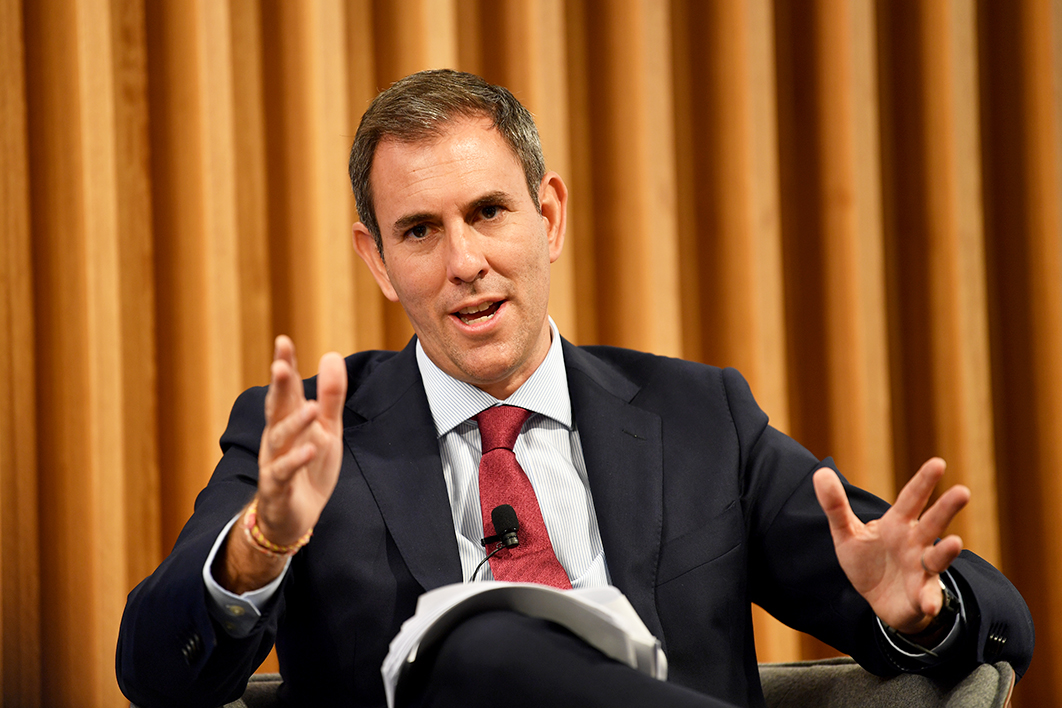On the day I read treasurer Jim Chalmers’s Monthly essay “Capitalism After the Crises” here in London, the British news was dominated by reports of debt collectors breaking into people’s homes.
A reporter from the Times had gone undercover in a firm contracted by British Gas to collect overdue energy payments. In a return to the days of putting a penny in the slot to heat the bathwater, his team had the job of installing devices that force customers to pay for gas before they use it. The meters serve two purposes: when consumers add money to their account, British Gas takes a share as part repayment of outstanding bills; and the pay-as-you-go system prevents customers from racking up even bigger debts.
The break-ins are authorised by court orders and intended as a measure of last resort. But of the 367,140 applications for warrants last year — that’s 1000 a day — only fifty-six were refused. The warrants are often “waved through” in bulk, with cash-strapped courts earning a fee per case from the arrangement. One magistrate quit when his job became “nothing more than rubber stamping.”
Energy companies are not supposed to force prepayment meters on families with children aged under five, pensioners, people living with a disability, or other vulnerable households. Yet the Times reported teams breaking into the homes of a single father with three young children, a mother with a four-week-old baby, and a woman whose daughter relies on a hoist and an electric wheelchair for her mobility.
In a British winter marked by soaring energy prices and week-long blasts of sub-zero temperatures, these families are condemned to live without heating or hot water whenever they can’t afford to put money on the meter. And when they do buy gas, they are charged a higher rate than customers paying by direct debit.
Not surprisingly, the Times’s exposé prompted outrage and moral condemnation, not least because Centrica, the company that owns British Gas, recently announced that its earnings in 2022 are likely to be more than seven times what they were in 2021.
This is the logic of Britain’s energy market. Centrica wants to derive maximum profit for its shareholders; customers who can’t pay their gas bills are bad for business so it’s happy to cut them loose; debt collectors are paid with a share of the funds they recover for their clients; prepayment meters are an effective mechanism to claw back as much money as possible. The work teams, which are paid a bonus every time they bust into a home and install a device, tend to overlook cuddly toys, Ventolin puffers, walking frames or other signs of household “vulnerability” that should prompt them to abandon the job.
Yet British Gas management, along with the government and regulators, professed to be surprised by the debt-recovery tactics. Centrica boss Chris O’Shea told the BBC that the contractors’ actions were “completely unacceptable.” The secretary of state responsible for energy, Grant Shapps, was horrified by such “abhorrent practices.” The energy regulator, Ofgem, launched “an urgent investigation” and asked energy companies to suspend the forced installation of prepayment meters until it is reassured that they comply with rules on vulnerability.
We hear equivalent surprise and outrage from corporate leaders, ministers and regulators when business scandals erupt in Australia. How could Rio Tinto have blown up those ancient rock shelters and destroyed so much priceless heritage at Juukan Gorge? Who are these rotten labour hire contractors who systematically underpay migrant workers labouring on farms and in meat-processing plants? What a shock it was to learn, at the financial services royal commission, that clients, some long dead, were being charged fees for no service, that a company duped Aboriginal people into buying overpriced funeral insurance, and that major banks knew their customers were being encouraged into unnecessary debt by mortgage brokers.
Yet such behaviours are entirely predictable and — in the narrow sense of allowing market forces to operate — entirely rational. It’s not that everyone working in finance, mining, labour hire or other scandal-prone sectors lacks a moral compass. It’s just that the attraction of bonuses and other incentives can quickly lead the best of us to lose our sense of direction. Human behaviour is shaped by the logic of the systems we inhabit. And, as NAB chair Ken Henry so memorably put it when he was grilled at the royal commission, “The capitalist model is that businesses have no responsibility other than to maximise profits for shareholders.”
Henry was echoing the views of economist Milton Friedman, who famously railed against the idea that corporations owed any kind of responsibility to the community beyond increasing their profits. Some reporting missed the fact that Henry was arguing, contra Friedman, that the banks needed to move away from treating “customers in purely instrumental terms, as a means to an end, rather than the end in itself.”
Treating people as ends in themselves is surely what Jim Chalmers had in mind when he wrote about creating “a better capitalism,” one that is uniquely Australian and “values-based.” It is a welcome prospect, and the treasurer has offered some glimmers of how it might be achieved.
A wellbeing budget that broadens what gets measured beyond the traditional metrics of GDP growth is long overdue. Welcome, too, is Chalmers’s emphasis on “place-based initiatives” in low-income areas like Logan, in his own electorate, to give communities “the genuine input, local leadership, resources and authority to define a new and better future especially for kids.”
Hearteningly, Chalmers draws on the work of leading thinkers like Mariana Mazzucato, who argues that contemporary economics has lost the moral sentiments that framed the Enlightenment ideas of Adam Smith, and now too readily mistakes price for value. Anyone who turns a profit ends up being a “wealth creator,” even when their earnings are derived from products like gaming machines or cigarettes and the social and financial costs are picked up by the community and government.
Chalmers, like Mazzucato, recognises that markets are not a natural phenomenon that sprang fully formed onto the landscape. They are human systems shaped by policies, laws and incentives. This is obvious from mundane examples — local-content quotas to encourage Australian TV production, for example, or building regulations to ensure fire safety in high-rise towers. If our aim is wellbeing, then we must design markets accordingly, and push to the margins the kind of knuckleduster capitalism revealed at the financial services royal commission and in the Times’s reporting.
Alongside the three crises at the heart of his essay — the global financial crisis, the pandemic and the war in Ukraine — Chalmers refers to Australia’s recent catastrophic fires and floods. And he acknowledges the need to “repair” long-neglected policy fields like “skills and training, energy and climate transition, the standard of aged care, women’s participation and economic equality, equal opportunities more broadly, including in regions and disadvantaged communities, and the unsustainable state of the nation’s books.” The government certainly has its work cut out.
But I can’t help feeling that Chalmers is waging his campaign for kinder capitalism with one hand tied behind his back. He makes only one reference to taxation in the essay — and that is to promise more transparent reporting on “tax expenditures” (concessions like negative gearing and private health insurance rebates that mean the government forgoes revenue). He wants “growth that puts equality and equal opportunity at the centre” and writes that “the type of growth matters — and its distribution matters.” Yet the word “redistribution” doesn’t get a look-in, let alone alongside another unmentioned word, “wealth.” Chalmers wants to tackle disadvantage but is silent on privilege.
Talk of equal opportunity without reference to tax and redistribution fails to take us very far beyond Scott Morrison’s empty notion that those who have a go will get a go. Admittedly, Labor is far more committed than the Coalition to education, training, childcare and healthcare — the kind of public investment that can bring such dreams closer. But if we want equality of opportunity then we must also tackle equality of outcomes. Capitalism is competitive, but we don’t all enter the race at the same point. Some of us get a big head start, and it would be only fair to even things up a bit.
Programs to build opportunity also require significant funding, and apart from extra borrowing — another no-go area for Chalmers given the “trillion dollars of debt” he inherited from the Coalition — the only way to raise sufficient money is through the tax system. Tax is not just good for raising revenue, though, it is also a powerful tool for shaping markets and influencing behaviour, as we saw with the Gillard government’s short-lived carbon price. It is also the most effective way to moderate inequality — and if Labor wants greater equality of opportunity, then this is what it must do.
Jim Chalmers starts and ends his essay with the pre-Socratic philosopher Heraclitus. I’m sure he’s also familiar with the more recent thinker John Rawls. In his Theory of Justice as Fairness, Rawls identified several reasons for regulating economic and social inequalities.
First, “it seems wrong that some or much of society should be amply provided for, while many, or even a few, suffer hardship.”
Second, large social and economic inequalities “tend to support political inequality.” We need to address inequality, he says, “to prevent one part of society from dominating the rest.”
Third, inequality shapes our sense of self, encouraging those towards the bottom to feel inferior and those at the top to feel superior. Rawls thought the attitudes engendered by inequality were great vices: “deference and servility on one side and a will to dominate and arrogance on the other.”
Rawls didn’t want to bring everyone down to the same level. He accepted that differences in status and hierarchy would persist, and probably recognised that they were necessary to drive ambition. But he insisted that “a well-moderated inequality is a condition of economic and political justice.” And such moderation cannot be achieved without progressive tax systems to redistribute income and wealth.
Of course, Jim Chalmers doesn’t want to scare the horses or provide conservative media with a new stick with which to bash Labor by hinting that he might follow the advice of most credible commentators (including the International Monetary Fund) and repeal the stage 3 tax cuts. Yet it is hard to see how Labor can fund the necessary services in care, education and environmental protection, balance the books, shape markets and increase opportunity without fundamental tax reform.
If a Labor treasurer in a government riding high in the polls can’t lead from the front by putting these issues on the agenda, then who can? •




